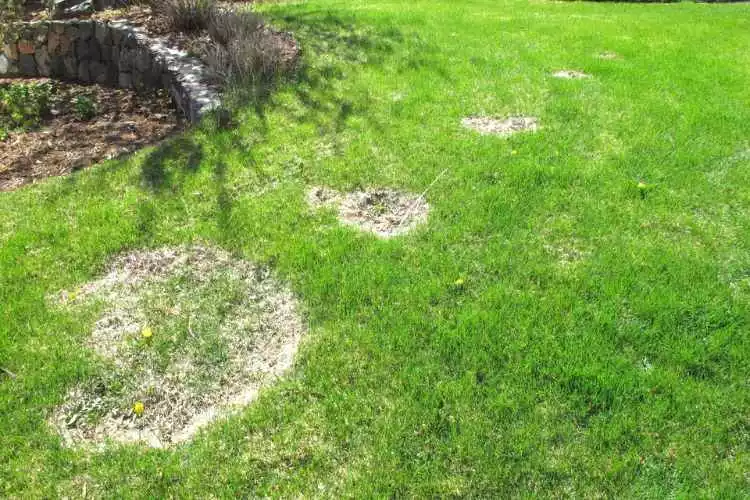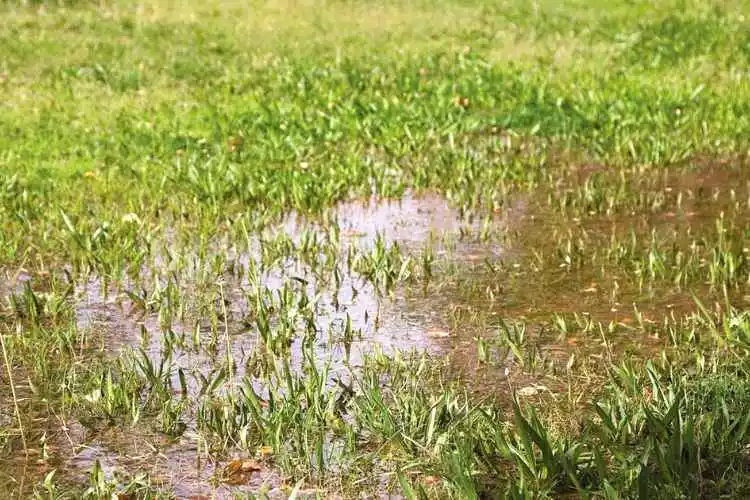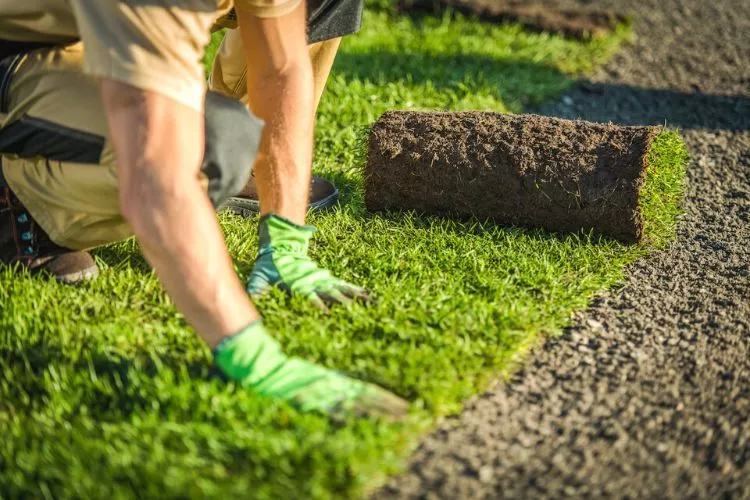The beautiful lush green grass in the center is undoubtedly the most attractive part of your garden. It is very important to take care of your lawn, and the rule of thumb is to maintain its greenery, you need to water it with appropriate measures.
However, how do you know how much water is too much water? Despite watering your lawn regularly, if it is still showing signs of stress and is not green enough, then you are not watering it properly. In fact, you are overwatering it. So, in this article we will discuss about how to fix overwatered lawn in a easy practical way.

How to fix an overwatered lawn?
Based on the climate, the quantity needs to be decided. So it is always advised to water it early in the morning because the temperature is cooler and there is less evaporation, which would allow the water to cool the lawn at hot hours.
The next session is a bit late in the afternoon when there is sufficient light to absorb water because you should not keep your lawn soaked in water overnight. The grasses are usually dehydrated if they curl, so you need to monitor the health of the grasses frequently.
1. Causes of overwatering
Many factors lead to overwatering your lawn. The climate and the evapotranspiration rate contribute greatly to whether you are overwatering your lawn. The amount of sunshine the grass receives is also counted.
Furthermore, the precipitation levels with rain and snow contribute to overwatering your lawn. If your lawn is in too much shade is also another factor that could lead to overwatering.

Consequences when you overwater your lawn
Those lawn grasses are in dire need of help if you overwater them. Because overwatering is detrimental to the growth of the grass by suffocating and stunting them. The soil particles are comprised of water and air pockets that enable sufficient water and oxygen to the grass roots and help them thrive well.
Overwatering leads to suffocating these pockets. Thereby, less oxygen is passed to the roots. If the soil is excessively waterlogged, the roots don’t struggle much to absorb water. Hence, it won’t extend down, leading to its stunted growth, creating a shallow root system that is more prone to diseases.

How To Fix Overwatered Lawn (Step By Step Guide)
It is very important to fix an overwatered lawn, or else it would permanently destroy the beauty and health of the grass permanently.

- Reduce water usage: Though it is essential to reduce watering your lawn, you should never stop overwatering it completely. Fix the quantity of water sprinkled based on the season, rainfall, and climate for the grasses to thrive beautifully.
- Aerating your lawn: It is mandatory to aerate and remove grass clippings. This enables a healthy lawn by compacting the soil. It also increases the nutrition uptake, and there is more organic matter in the soil. Drainage pipes should be installed so there is no water logging, as that would create fungal growth.
- Dethatch: It’s always advised to dethatch your lawn whenever it’s over ½ inches. But this step can be quite tiring.
- Remove Bugs: While you are dethatching the grass, it will help you to locate those bugs that would affect the health of your lawn grass immensely. Identify the right kind of bugs and look for a pesticide that would kill them without affecting your lawn.
- Fertilizers: It is very important to improve water retention by adding appropriate fertilizers like mulch, compost, and other organic matter that would improve the quality of the grass.
- An overwatered lawn lacks nutrients in the soil affecting its growth. Replenish your lawn with the required nutrients by applying the right fertilizer. So it is very important to know exactly what nutrients are missing though it is always best to apply all-round fertilizer.
- An overwatered lawn lacks nutrients in the soil affecting its growth. Replenish your lawn with the required nutrients by applying the right fertilizer. So it is very important to know exactly what nutrients are missing though it is always best to apply all-round fertilizer.
- Water conserving: Water needs to be conserved by drip irrigation and rainwater harvesting. It is also advised to use drought-tolerant grasses. This way, you would ensure there is no further room to overwater the lawn grasses, and it would also recover the health of the grasses that are already overwatered.
What are the signs of an overwatered lawn?
If there is any health issue, it is very important to identify symptoms of an overwatered lawn so that the treatment should be applied based on these signs.
- Fungus: Overwatering your lawn will always lead to fungal growth, which can be identified when the blades of the grass turn yellow or brown. Furthermore, if there is mushroom growth, it is also harmful to pets and children.
- Spongy lawn: If you step onto several parts of the lawn, and if in any place, it would feel spongy or squishy, then it is overwatered.
- Discoloration: If the color of the grass is not lush green and instead it is light green, yellow, or even brown, then definitely, by overwatering, you are washing away the nutrients. It is also a symptom of root rot.
- Thatch: It is that layer of decomposed plant materials broken by soil organisms to provide nutrients to the soil. Overwatering would lead these organisms to break down the thatch layer, which is visibly scattered all over the lawn. It would lead to entering less oxygen into the roots and promotes its excessive deep growth, thereby affecting its quality.
- Runoff: If there is too much water runoff, the lawn is overwatered. Also, too much water runoff would lead to washing away the essential nutrients that are very important for the growth of the grass and maintaining the quality of the lawn.
- Weeds: Overwatering the lawns would be a heavenly place for weed growth, such as yellow nutsedge and smooth crabgrass.
- Infestation of Bugs: Deep layer of thatch by overwatering not only leads to less oxygen and a deep root system but also provides a heavenly abode for the birth and growth of bugs that can cause serious menace and devastating outcomes.
You May Also Find Useful: Should You Water The Lawn After Applying Fungicide
frequently asked questions (fAQs)
How long does it take for overwatered grass to heal?
It would take a minimum of two to three weeks for the overwatered lawn to heal. However, in case of severe fungal growth such as necrotic ring spot fungus, it would take almost 6 months to even a year for the lawn grass to recover completely, depending on the amount of fungal outbreak.
Can grass turn brown from overwatering?
Yes, the grass can turn brown by overwatering your lawn, leading to brown patches all over the lawn. The majority of people mistake it by knowing there is less water. However, the fact is just the opposite. This happens when you overwater the lawn by clogging the air space.
Will flooded grass grow back?
You need to take immediate action if there is flooded grass. Hence it is always advised to plant flood-resistant grasses that can withstand several days or weeks of flooding. However, it is advised to stake the flooded areas and rototill them, which would let the soil loose. After this process, you can reseed or sot the area.
What color does grass turn when it is overwatered?
If your lawn is overwatered, it will never have that bright, lush green color. Instead, there would be brown patches and red, yellow, orange, or light green grass blades by which you would know that there is something wrong with the lawn because of overwatering it.
Conclusion:
If you love gardening, then the lawn is an integral part of your garden. You would always love to maintain its lush green color.
However, it does not remain so if you overwater them. It would lead to many problems like the change of color, fungal and weed growth, insufficient oxygen to the grassroots, water logging issues, brown patches all over, and many more. So it is essential to identify them and fix those issues to regain the quality of the lawn and I hope this guide regarding how to fix overwatered lawn would help you.
